Article published in the Unicamp Portal highlights the technological and scientific advances discussed at the 6th BRAINN Congress.
Read more…
BRAINN and Enigma: International partnership enables advances in research into debilitating diseases
By Maria Fernanda Ziegler, in New York | Agência FAPESP – Research conducted by the ENIGMA international consortium has studied the brains of more than 3,800 volunteers from several countries for the purpose of discovering similarities and differences between brain anatomy and different types of epilepsy. The goal is to seek markers that help in disease prognosis and treatment.
Another group of researchers is using analysis of patient levels of two microRNAs, genetic markers that serve as indicators of Amyotrophic Lateral Sclerosis (ALS) – the disease that affected British physicist Stephen Hawking.
A third study, also on epilepsy, suggests that deregulation of the NEUROG2 gene is related to the appearance of focal cortical dysplasia – a brain defect that is one of the most common causes of medically refractory epilepsy. With identification of this biomarker, it will be possible to indicate various treatments such as surgery for patients who suffer from drug-resistant epilepsy.
The three studies include participation by researchers from the Brazilian Institute of Neuroscience and Neurotechnology (BRAINN), a Research, Innovation and Dissemination Center (RIDC) funded by FAPESP, headquartered at the University of Campinas (Unicamp).
“Our objective is to develop new methods and techniques to improve our understanding of how to treat and prevent debilitating diseases and conditions that affect the brain, such as epilepsy and cerebral vascular accident (CVA). We are also interested in studying diseases that cause dementia or motor problems, as in the case of ALS,” said Iscia Cendes, principal investigator of BRAINN, in a talk given at FAPESP Week New York – held at the City University of New York (CUNY) November 26-28, 2018, the meeting involved Brazilian and U.S. researchers with the aim of strengthening research partnerships.
“Human beings, just like the diseases we are studying, are very complex. That is why we think that participation in consortia and partnerships is the best way to leverage our discoveries,” Cendes said.
The researcher said that since the establishment of BRAINN, in 2013, the number of big data projects in neuroscience has increased. Examples of these types of projects include the BRAIN initiative in the United States, the Human Brain Mapping initiative in Europe, the Alzheimer’s Disease Neuroimaging Initiative (ADNI), the International League Against Epilepsy (ILAE) and the ENIGMA consortium.
“Big data efforts have become the modus operandi of neuroscience, replacing small-scale science based on hypotheses,” she said.
It is no coincidence that Cendes says that the next BRAINN projects will include advancing longitudinal studies. “That is one of our strong points as a group,” she added.
BIPMED
Another BRAINN proposal is reducing the gap between basic biological research and its clinical application. One of the lines of research for that purpose is the Brazilian Initiative on Precision Medicine (BIPMed), an initiative created in 2015 by five FAPESP-funded RIDCs.
“The first BIPMed product was creation of a database of genomes corresponding to healthy individuals and those with specific diseases. There are currently more than 900,000 genetic variants deposited in the database,” she said.
The database includes deposits of genomes related to epileptic encephalopathies, craniofacial anomalies, breast cancer, hereditary deafness and neurofibromatosis, and in 2019, sequences related to lupus will be added.
4th BIPMED Workshop
The São Paulo Research Foundation (FAPESP), under the scope of the program Research, Innovation and Dissemenation Centers (RIDCs), and the Brazilian Initiative on Precision Medicine (BIPMed) invite you to BIPMed´s IV Workshop, in conjunction with the III Meeting of the Brazilian Node of the Human Variome Project (HVP-BRAZIL).
Check the preliminary program below.
Preliminary Program
- 1:00PM-1:15PM – Registration
- Panel 1 – Current status:
- 1:15PM-1:30PM – Update on the new developments in the BIPMed genomic databases. Cristiane S. Rocha. BIPMed Project Manager.
- 1:30PM-1:45PM – New BIPMed products. Welliton Souza/Benilton S. Carvalho , Department of Medical Genetics, School of Medical Sciences/Department of Statistics, Institute of Mathematics, Statistics and Scientific Computing; University of Campinas (UNICAMP).
- 1:45PM-2:00PM – The Latin American Database of Genetic Variation (LatinGen) –Lavinia S. Fachini. President of the Latin American Network of Human Genetics (RELAH).
- 2:00PM – 2:15PM – The Brazilian BRCA-Challenge. Patricia A. Prolla. Department of Genetics, Federal University of Rio Grande do Sul (UFRGS).
- 2:15PM – 2:30PM – Discussion
- 2:30PM – 2:45PM – Coffee break
Panel 2 – Projects currently using BIPMed data:
- 2:45PM – 3:10PM. Mitochondrial haplogroups and GWAS of pharmacogenomic markers. Marcelo Briones. Department of Health Informatics. Federal University of São Paulo (UNIFESP).
- 3:10PM – 3:35PM Identifying local ancestry deviations in Brazilian individuals. Rodrigo Secolin. Department of Medical Genetics. School of Medical Sciences. University of Campinas (UNICAMP).
- 3:35PM – 3:50PM – Discussion
Panel 3 – Can other initiatives be integrated using the federated model?
- 3:50PM – 4:15PM. The ABraOM database – Mayana Zatz. Center for the study of the Human Genome. University of São Paulo (USP).
- 4:15PM – 4:40PM What admixed populations tell us about natural selection. Diogo Meyer. Department of Genetics and Evolution Biology. Institute of Biosciences, University of São Paulo (USP).
- 4:40PM – 4:55PM. Discussion
- 4:55PM – 5:00PM. Closing remarks and invitation for next meeting. Iscia Lopes-Cendes. Member, steering committee BIPMed and HVP-BRAZIL.
BIPMED: 1 Year and Forward
The São Paulo Research Foundation, FAPESP, under the scope of the program Research, Innovation and Dissemination Centers (RIDCs), and the Brazilian Initiative on Precision Medicine, BIPMed, invite you to the
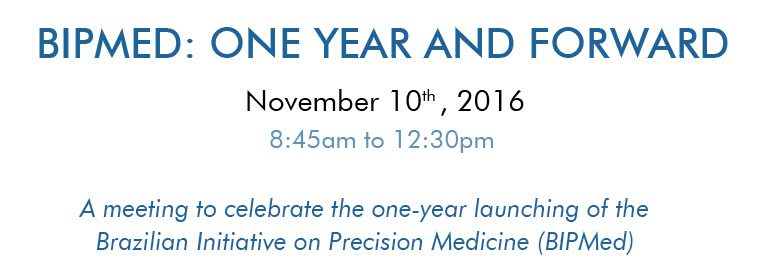
On November 13, 2015, BIPMed launched the first public genomic database in Latin America (bipmed.iqm.unicamp.br). The main objective of this initiative is to promote the sharing of genomic and phenotypic data, respecting international guidelines for the ethical and responsible work with this type of private information. These guidelines have been proposed by the Global Alliance for Genomics and Health (https://genomicsandhealth.org
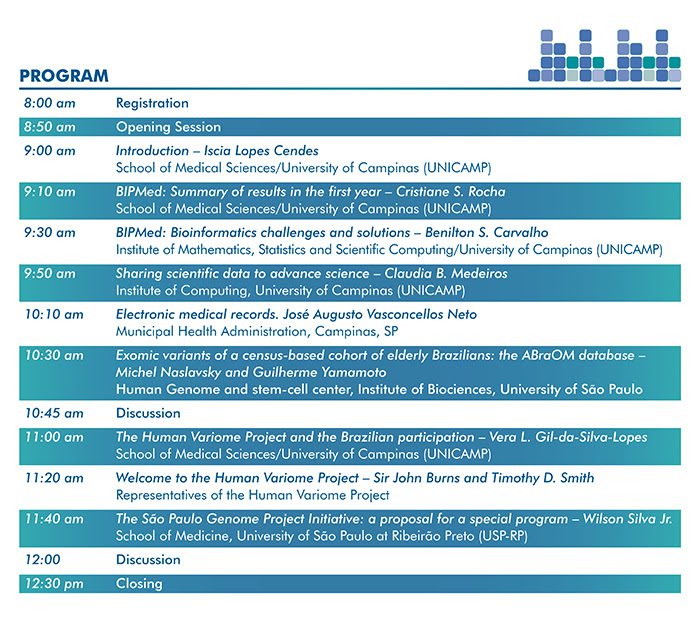
The BIPMed genomic database has had great success, with an impressive number of visits to the website by users from all over the world. It is now time to report the results achieved in the past year, and to discuss ways to expand and improve this initiative as well as new products that can be developed under the BIPMed umbrella.
BIPMed is an initiative of five Research Innovation and Dissemination Centers (RIDCs): The Brazilian Research Institute for Neuroscience and Neurotechnology (BRAINN), Center for Computational Science and Engineering (CCES); Center for Research in Cell Therapy (CTC); Obesity and Comorbidities Research Center (OCRC) and Center for Research on Inflammatory Diseases (CRID).
Updated information:
www.fapesp.br/eventos/bipmed16



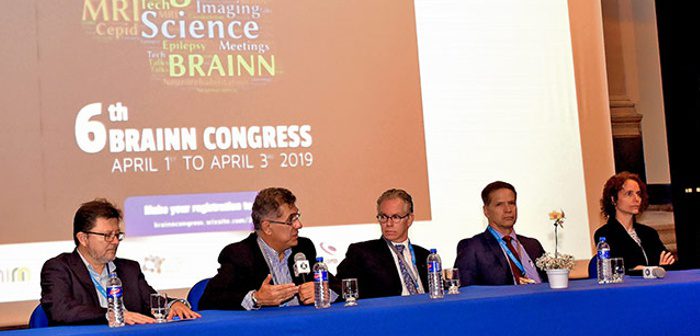
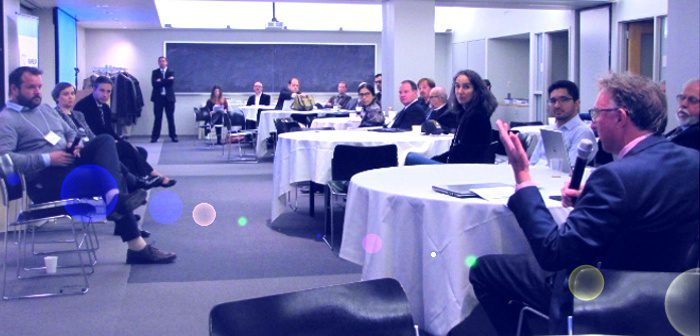
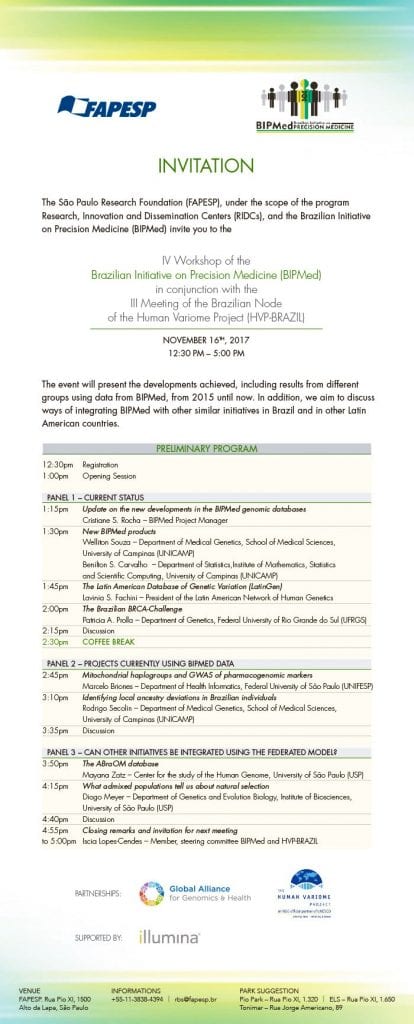
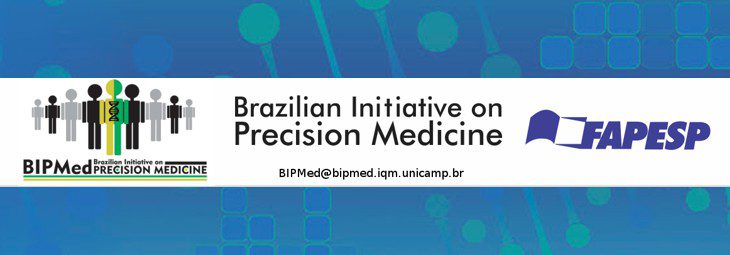


 Português do Brasil
Português do Brasil